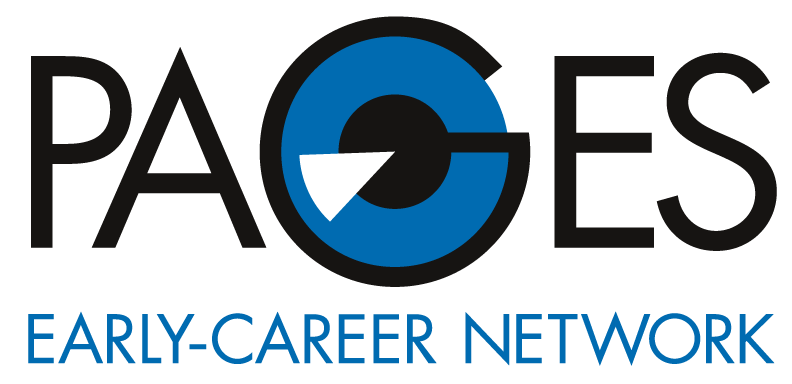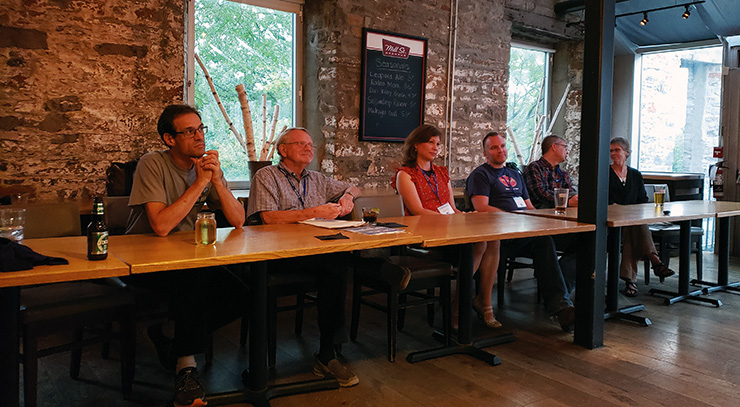- Home
- Publications
- PAGES Magazine
- Advice For Early-career Researchers: A Summary From The AMQUA/CANQUA Student Mixer
Advice for early-career researchers: A summary from the AMQUA/CANQUA student mixer
Carter V
Past Global Changes Magazine
26(2)
80-81
2018
Vachel Carter1,2
Job prospects are one of the most pertinent topics for early-career researchers. At the joint AMQUA/CANQUA meeting, a panel of senior researchers shared their career advice specifically for early-career paleoscientists. Here, I'd like to share with you their advice.
Recently, I attended the joint American Quaternary Association/Canadian Quaternary Association (AMQUA/CANQUA) conference held in Ottawa, Canada, from 7-11 August 2018. The organizers arranged a ‘Student Mixer and Mentoring Panel’ event that was sponsored by the US National Committee (USNC) for Quaternary Research. Roughly 40-50 early-career researchers (ECRs), including Masters and PhD students, and postdocs attended. Seven panelists (Fig. 1) gave splendid advice for ECRs.
From Christopher Hill, Professor at Boise State University in the Departments of Geosciences and Anthropology, on assignment as a Program Director at the US National Science Foundation.
"As part of your graduate studies, please think about the value of non-academic internships. Non-academic internships provide an opportunity to have experiences and get skills that can prepare you for a great career in science. Examples of these types of internships may be opportunities in government agencies (at local, state, or federal levels) or national laboratories, non-profit organizations, or for-profit business (businesses of all kinds). Think about working with your graduate advisor or mentor and consider the types of internships that might be integrated into your graduate research. An ideal situation might be an internship opportunity that provides you with experiences and contacts not available at your university and is also a project that can be integrated into your graduate studies and research. Internships are an amazing opportunity to gain additional expertise and also learn about great careers where you can apply your training in science."
From Tony Layzell, Quaternary geologist at the Kansas Geological Survey.
"My success in graduate school (both Masters and PhD) was largely driven by the advisors I was fortunate enough to work with. I would suggest that graduate students find an advisor that is the best fit for them (some students prefer minimal supervision, some prefer more hands-on support, etc). The best fit is not always the most reputable scientist in your field.
If early-career scientists are wanting to go into academia then publishing is a must. Every project I was involved with, including those unrelated to my dissertation, was published in a peer-reviewed journal of some kind. Whether we like it or not, journal articles are the coin of the realm.
Competition for academic positions is fierce and most will have to do a postdoc before a tenure-track or equivalent position. While doing a postdoc make sure that you have the time and flexibility to publish everything from your dissertation. Finding a way to stand out from the crowd is also vital. My advice is to always do what interests you the most, what you are most passionate about, but try to make it relate to your desired career in some form. This is particularly important if you have to take an alternative career path or have to take multiple postdoc jobs while seeking an academic position. Stay relevant by publishing or by teaching in some capacity if you ultimately want an academic job.
Networking is also key. Try to go to as many conferences as you are able. Seek out other scientists in your field and ask them about their research. You will need these people to write you letters of recommendation when you go up for tenure. The days of the independent scientist are waning – collaboration, communication, and collegiality are vital in science today."
From Rolfe Mandel, Distinguished Professor of Anthropology at the University of Kansas, Director of the Kansas Geological Survey, and Chair of the US National Committee (USNC) for Quaternary Research-INQUA.
"It’s important to be really good at something, but not to overspecialize. Diversify your skill set to include things like GIS and remote sensing. Being adaptive allows you to be a better team member and makes you more marketable in the workforce. There are other opportunities outside of academia, namely government agencies, such as the National Park Service, US Geological Survey, and state geological surveys, and private consulting firms; they are in need of good Quaternary researchers. Leaving academia is not a negative thing; you won’t disgrace your mentors if you leave academia. It’s not a problem to step out for a bit, but if you do take a break, you should stay in the mix by continuing to read articles in your field, publishing your research, attending conferences, and maintaining contact with your collaborators."
From Kendra McLauchlan, Full Professor of Geography at Kansas State University, on assignment as a Program Officer at the US National Science Foundation.
"There are a couple of inherent advantages and disadvantages when you are a Quaternary scientist, or PAGES-type scientist.
Advantages: (1) By training in the paleosciences, you are quite interdisciplinary compared with most PhDs. Even a specialized PhD requires thinking about paleoecology, paleoclimatology, geochronology, Earth surface processes, and the human dimension. Just look at the diversity within and among PAGES working groups. It is a huge advantage to be trained in such an interdisciplinary science. (2) Your skills are probably quite sharp compared with most PhDs. Again, to complete a PhD you have to be proficient in several techniques, and cognizant of many others. For example, the multiproxy work that so many of us do demonstrates really advanced analytical skills. Our science still has a good component of field work, as well as lab work, and statistical and data management work. These are extremely desirable skills in many job markets.
Disadvantages: (1) You will likely never see a job ad with a title that you think exactly describes your training. You will have to be creative about connecting job ads, especially the title of job ads, with your own training. You will likely have to search several job-posting places, focused on different intellectual and geographic areas, to find a good fit. But be creative about this! (2) Landing a non-academic job can be difficult. This is true across many scientific disciplines (there is a lot of primary literature on this), due to well-documented phenomena such as the location of training in universities, the perceived prestige of academic jobs, the lack of diversity in advanced degree types, and the lack of ability of traditional mentoring to connect with non-academic jobs. This is slowly starting to change, but you will likely have to hasten the pace if you are interested in a non-academic job. Again, the good news is that paleoscientists are well-trained for non-academic as well as academic jobs, it will just take some work to fit the match.
Now, just a few pieces of advice. Think deeply about what your goals are, as early on as possible. Once you identify those, work toward them. Everything you do in your career − every paper, every presentation, every professional conversation − should be working toward that goal. Ask your mentors and colleagues to help get you there, and seek out opportunities for training that will help you reach your goals. Finally, a career is not a race. Be open to different paces, and different paths, and even once you cross a type of finish line by landing a job, you’ll need to keep growing, and creating, and pushing ahead!"
From James Teller, Professor Emeritus in the Department of Geological Sciences, University of Manitoba, Winnipeg.
"I had outstanding advisors, who understood that I needed guidance, but who respected me (after getting to know me) and realized that I worked well with a minimum of supervision. I love what I do, and never am shy to tell others that I do. I think all geoscientists should communicate with the public, media, policy makers, etc, telling them in an enthusiastic way and in understandable language about the profession you love.
My advice: Work hard and play hard. Accept all challenges and take on even more than you think you can easily manage, but with a realistic understanding of yourself and the commitments. Be vigilant about what’s going on in your research area, department, and company, and never miss an opportunity. Your success in being hired and in your career will depend on your geoscience skills and on your people and communication skills – do not underestimate the latter. Secure a permanent job as soon as you can after graduating; do not take a lot of temporary jobs or postdocs, as it will negatively impact on securing permanent employment. Being able to write clearly and professionally is extremely important. Stand out (in a good way), so your resume (and your interview) puts you into the pile of “Finalists”, rather than keep you as part of the herd of other applicants. Do your best, always. Cultivate opportunity. Enjoy being with your colleagues, be cheerful, be positive. As someone famous once said: ‘The harder I work, the luckier I seem to be.’"
From Cathy Whitlock, Professor of Earth Sciences at Montana State University and Fellow of the Montana Institute on Ecosystems.
"If you’re applying for a faculty position at a research and teaching institution, here are a few suggestions that might elevate your chances for an interview. Your cover letter is the first piece of information for the search committee, so it should be short, well written, and clearly articulate your research and teaching interests in a way that sound like a good fit for the position. It is smart to express some enthusiasm for the particular position and institution and show some appreciation for the guidance of your mentors. The search committee usually looks at your list of publications next. Even if you are in graduate school, there should be evidence that you are publishing in impactful journals and have the ability to work collaboratively. Evidence of external funding, even small research and travel grants, is important as well. The committee also looks at your teaching and public communication experience to see if you have the potential to be an inspiring educator. Beyond these items, describing your participation in broader engagement activities can help elevate your application. Working with teachers and students, communicating science to the public, and community or disciplinary service all catch notice. It will likely take more than one try to land an academic position, but just remember that each application and interview prepares you to do better on the next, so stay positive!"
Final thoughts
As an ECR, I found the information above very insightful. The most relevant bit of information for me was the advice from Kendra McLauchlan, “...seek out opportunities for training that will help you reach your goals.” Personally, I have taken the opportunity to work with new colleagues post my PhD who have provided new skill set training, all in the hope that these new skill sets will help me reach my end goal. I hope you found the panelists advice as insightful as I did.
affiliations
1Department of Botany, Charles University, Czech Republic
2PAGES ECN Steering Committee Member
contact
Vachel Carter: vachel.carter gmail.com
gmail.com

